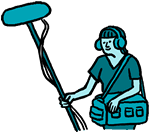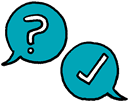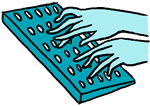Collections Care
The preservation of our past is vital to our present and our future. Our Collections Care grant helps King County’s archivists, librarians, and historians protect the tangible objects that make up history so that the generations of today and tomorrow can continue to learn from them.
- Applications will reopen in 2025 with more awards and funding! Find other opportunities on our Grants + Artist Calls, Listings, and Community Resources pages.
- Current grant contracts will continue to be honored.
- Subscribe to our newsletter for updates and please don't hesitate to contact us with questions. We’re here to help!
Steps to Apply
1 What Collections Care Funds
1 What Collections Care Funds

Our annual Collections Care grant program supports the work of King County non-profit heritage organizations by providing the funds necessary to assess, organize, catalog, clean, repair, document, digitize, and, ultimately, preserve heritage resources in King County.
You can use this grant for:
- The care of historic and cultural materials, artifacts, and archival records held in public trust and regularly accessible for the public
- Purchasing materials and consumable supplies used for collections care purposes.
- Developing and/or implementing a collections management policy, improving emergency preparedness plans, instituting and improving security methods for collections.
- Performing collections needs assessment surveys and implementing recommendations, completing inventories, descriptive catalog, and/or condition surveys, bridging a funding gap to conduct assessments such as Museum Assessment Program, Collections Assessment for Preservation Program, or Standards and Excellence Program for History Organizations.
- Digitizing of collections or archives to minimize handling.
- Training and professional development for staff and/or volunteers in preventive collections management.
- Contractor fees for conservators, heritage specialists, interns for collections care projects; fees directed to staff, if their work on the project is outside their regular job duties and payment is structured as contractor fees.
- The care of historic and cultural materials, artifacts, and archival records held in public trust and regularly accessible for the public
You cannot use this grant for:
- Major equipment purchases, construction or fabrication projects, general operating support, overhead costs and fees, employee benefits or any regular staff salaries (we offer separate grants for these—please see Cultural Equipment, Cultural Facilities, and Sustained Support).
- Elements of your project completed before funds are awarded on September 27, 2023.
- Projects for which fundraising is the primary purpose, direct marketing or advertising costs, or projects that do not focus on heritage in King County as a foundational element.
- Restoration of historic structures, the preservation of the built environment, or the stabilization of archaeological sites.
- The purchase of art and artifacts.
- Support of collections that are privately held or not regularly accessible to the public.
We Want to Hear From You!
We are currently assessing heritage preservation needs in King County. If you have a preservation need that doesn’t feel eligible for this program, we want to hear about it. This assessment will help us understand how we can better support a wide range of heritage preservation practices. If you would like to share with us, please contact Megumi Nagata at megumi.nagata@4culture.org.
Criteria
All applications to this program will be evaluated in a competitive process by community reviewers during.
For this particular grant, we’ll look to see how well your project shows the following:
- Quality: how your project meets the goals of your organization’s mission or needs in the community, how well your project aligns with professional standards, best practices, and culturally-specific needs of source communities.
- Project impact and public benefit: how your project develops and preserves heritage in King County, its potential to cultivate understanding of heritage of diverse communities in King County, its potential to raise the visibility of heritage collections care and preservation, its ability to preserve heritage resources held in the public trust, your project’s ability to generate broad and/or lasting public benefit.
- Feasibility: your organization’s ability to develop and complete your project within 24 months of the award date. This is demonstrated through the qualifications of you and your project team, and your budget—including your ability to raise additional funding if needed. Demonstration that your organization has completed the necessary planning and assessment to care for collections in the long-term.
- Advancing equity: how clearly the project is preserving the heritage of historically marginalized communities in King County, especially communities that have been disproportionately impacted by structural racism. How clearly those source communities are involved in the decision making of the project.
Public Benefit: Why It Matters
Every time a visitor to Washington State stays in a hotel, they pay a Lodging Tax—this is where our funding comes from, and our mission is to put it back into the community. As you work through your application, tell us exactly how your fellow King County residents will be able to enjoy and learn from your work. Read about public benefit more in depth here.
2 Are You and Your Project Eligible?
2 Are You and Your Project Eligible?

You
- You must be a registered King County-based nonprofit that is stewarding or serving collections located in King County that collects and preserves historic artifacts, photographs, documents, and ephemera.
- You must be a King County-based nonprofit organization that stewards collections of historic artifacts and records that are held in the public trust and regularly accessible to the public.
- We do not fund K-12 schools, school districts, or religious worship or instruction.
Your Project
- Your request amount must be at least $1,000, but no more than $8,000.
- Your proposed project must focus primarily on collecting, cataloguing, inventorying, and/or preserving the historical record in King County, i.e. historic and cultural materials, artifacts, and archival records.
- Your proposed project should demonstrate a public benefit to King County residents and visitors—learn more about that requirement in the “What Collections Care Funds” section of this page.
- This program gives priority to basic collections issues and provides institutions with support to evaluate collections needs and to implement resulting recommendations.
- If you are a college or university, your project must be accessible beyond your student body.
3 Helping You Succeed
3 Helping You Succeed
 Workshops
Workshops
Workshops can make a significant difference in the strength of your application—each year, we find that the strongest applications come from people who have attended a workshop. 4Culture Heritage staff are available to answer questions, discuss project details, and review draft applications. All workshops will be held remotely. Please register via the links provided to receive Zoom meeting information. You will need a personal Zoom account in order to attend a workshop. If you are unable to attend, a recording is available below.
This grant is currently closed. Workshops will be posted 6-8 weeks before the next deadline date.
Digital Collections Webinar Series
In addition to our general program workshops listed above, this year we are also offering a digital collections webinar series that will provide an overview of the digital collection lifecycle, project planning, and digital collection platforms. This series is a response to the increasing number of digital preservation project proposals we receive through this program. The webinar dates are April 10, 17, and 24.
register for digital collections webinar series
Tutorial Video
Watch this step-by-step application tutorial video to assist you through the process of creating an account, starting your application, and saving it for later.
Resources
In 2022, this program had 26 applicants and 21 were funded, 64% of the total request amount was funded.. Keep in mind that this is a much smaller funding program than our Projects grant—the average award in 2022 was $5,254. We encourage the review panel to fully fund quality projects but partial funding is often awarded.
View the previous cycle’s applicants on our Past Grants page. Read through a sample successful application.
You can also read through the application questions before getting started:
- Project description: Explain the proposed project activity. What is the need, challenge, or opportunity your collection or archive faces and how do you plan to address it? Why is the proposed project a priority to your organization at this time? How does this project align with your current collections management plan or priorities?
- Project impact and public benefit: provide an overview of the collection(s) involved and its historical significance to your community and King County. Who will benefit from the proposed project and have they been involved in planning the project? How will the public benefit from or access the results of your project? Please describe your plan for long-term preservation, including for digital files, after the contract for this project is over?
- Relevant expertise/experience/accomplishments: describe who will plan, implement, and manage your project. Does the identified project team (staff, project partners, consultants, and volunteers) possess the knowledge, experience, and skills necessary to complete the work successfully? Cite similar project-based work that has been successfully managed and/or administered by the project team. How do your choices of collections care methods, equipment, and supplies demonstrate an understanding of best practices and professional standards? If you are working with objects from another culture or community, how are members of that community involved in this project?
- Project implementation: provide a work plan that addresses phases for planning, fundraising, execution, publicity, and evaluation. Within each phase, describe responsible personnel, major milestones, tasks, outputs, and deadlines. When and in what sequence will the activities take place? Remember, projects funded through this program must be completed within 24 months of the award date.
- Advancing equity: please explain if the source community for the materials being preserved are historically marginalized peoples or communities in King County, especially communities that have been disproportionately impacted by structural racism? Will members of the source community have a decision-making role in this project? If so, please explain?
Contact
We’re here to help! Please contact us if you have a question about this program, or if you would like to have your application draft reviewed by a 4Culture staff member. Please note that requests for draft reviews must be submitted at least 2 weeks before the application deadline.
Chieko Phillips
chieko.phillips@4culture.org
206-477-6811
Translation and Assistance
The guidelines, a detailed explanation of how to apply, and the application are in English. If this is a barrier that stops you from understanding the grant or applying due to limited English writing ability, visual impairment, or you would like to request assistance to create an application, please contact hello@4culture.org or call (206) 296-7580 or TTY 711, and we will make sure you get the support you need.
Las pautas, la explicación detallada de cómo enviar la solicitud y la solicitud están en inglés. Si esto le impide comprender la información relacionada con la beca o enviar una solicitud debido a una limitación en la capacidad para escribir en inglés, si tiene una discapacidad visual o si desea recibir asistencia para crear una solicitud, escriba a hello@4culture.org o llame al (206) 296-7580 o TTY 711, y nos aseguraremos de que obtenga la ayuda que necesita.
详细说明如何申请的指南以及申请本身均使用英文。如果由于英语写作能力有限、视力障碍而妨碍您对本资助的了解或申请,或者您希望请求协助来完成申请,请发送电子邮件至 hello@4culture.org 或致电 (206) 296-7580 或 TTY (听障专线) 711 联系,我们会确保您获得所需的支持
Руководство, подробная инструкция и форма заявки на английском языке. Если вам сложно разобраться в процедуре получения грантов или подачи заявок из-за ограниченных навыков письменного английского языка либо нарушений зрения, а также если вы бы хотели обратиться за помощью при составлении заявки, отправьте письмо на адрес электронной почты hello@4culture.org или позвоните по номеру (206) 296-7580 или 711 (телетайп), и мы позаботимся о том, чтобы вы получили необходимую помощь.
Hướng dẫn, giải thích chi tiết về cách nộp đơn va tài liệu áp dụng tất cả đều bằng Tiếng Anh. Nếu đây là rào cản khiến quý vị không hiểu được khoản trợ cấp hoặc cách nộp đơn do khả năng viết tiếng Anh hạn chế, do quý vị bị suy giảm thị lực hoặc muốn yêu cầu hỗ trợ để tạo đơn đăng ký, làm ơn liên hệ hello@4culture.org hoặc gọi (206) 296-7580 hay TTY 711 và chúng tôi sẽ hỗ trợ những gì quý vị cần.
Tilmaamaha, sharaxaadda faahfaahsan ee ku saabsan sida loo codsado, iyo waraaqda codsiga waxa ay dhammaan ku qoran yihiin Af-Ingiriisi. Haddii ay arrintani tahay caqabad kaa hor istaageysa fahamka deeqda ama codsashada oo ay sabab u tahay awoodda qorista Af-Ingiriisiga oo xadidan, araggaaga oo liita, ama aad jeclaan lahayd inaad codsato in lagaa caawiyo in aad codsi sameyso, fadlan la xiriir hello@4culture.org ama wac (206) 296-7580 ama TTY 711, waxaana xaqiijin doonnaa inaad hesho taageerada aad u baahan tahay.
4 After You Submit
4 After You Submit
 Timeline
Timeline
Most 4Culture grants take approximately three months from application deadline to when we announce our funding decisions. You can start your project—or the portion of your project described in your application—no earlier than September 27, 2023, and you must complete it by October 1, 2025, or within 24 months of the award date.
Panel Process
We make all of our funding decisions through a panel process, in which a group of peers working in the heritage field assesses your application. 4Culture staff recruits panelists with considerations for racial equity, diversity of geographical location, organization size, and experience in the field. 4Culture staff facilitates the panel process but does not vote or try to influence the outcome. There will be no in-person interviews for this grant program.
This program implements an equity investment practice towards countering institutional inequities in grantmaking. First, there is a question specifically asking if you or your project has a primary focus to center and serve historically marginalized people or communities in King County. The answer to this question will be scored against the Advancing Equity criterion, which holds the same weight as the other three criteria for this program—five points.
Second, applicants that are located within a 4Culture Equity Investment area and that receive a high Advancing Equity score will be eligible for an equity investment. 4Culture recognizes that where an organization or cultural worker is based or provides its services can affect access to funding and other resources. Many cultural organizations and cultural workers in greater King County have less access to public and private support than those located in Seattle. To take a step towards balancing these disparities, projects located in a 4Culture Equity Investment area will receive additional consideration during the grant evaluation and awards process. Projects qualify as being in an Equity Investment area by meeting one of the following requirements:
- You or your project site are located outside of the City of Seattle.
- You or your project site are located in Seattle but is also in a 2010 US Census tract area with a Communities of Opportunity index percentile of 60% or greater.
If you would like information about the panel process or how to be on a 4Culture Heritage panel, please contact Chieko Phillips.
Contracts and Payment
If we select your project for funding, 4Culture Heritage staff will work with you to create a contract outlining the scope of your project and a payment schedule.
Requirements and Appeals
Learn about what will be required if you are awarded a grant, and about the process for appeal of a 4Culture decision.
5 Apply
5 Apply

Once you’ve started your application, you can save after each step and sign out—your application will be saved as a draft that you can continue to work on up to the deadline. Once you hit “Submit,” your application is final. Please do not hesitate to contact us if you have any questions during the process.
What We Require
In addition to the Narrative Questions, we will not consider your application without the materials listed here. We strongly recommend assembling them before you login and begin your application, and encourage you to call or email us with any questions as you work on these materials.
Demographic Information in your Account Profile
Your organization profile in our portal must provide demographic information for your board and staff for the current year. We use this information to help us understand how well we are doing in our efforts to reach all communities in King County. It is not used in funding decisions.
Project budget in your Application
Use our Budget Form, which is embedded in the application. In Budget Notes section, explain each line item and how you intend to use 4Culture funding.
Board List in your Application
This is required for organizations only, not for public agencies. Organizations must submit a list of board members, including their service dates, term limits, and brief background information.
Optional Materials in your Application
Optional support materials might include: resumes of project personnel, letters of support, first five pages of collections management policy, relevant inventories, condition reports, assessment reports (5 pages maximum), portion of strategic plan showing collections priorities (5 pages maximum) to help illustrate your proposal. Support materials must be under 2 MB.
